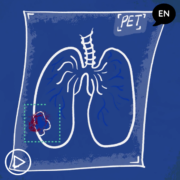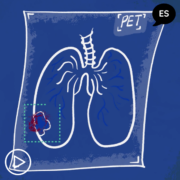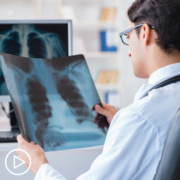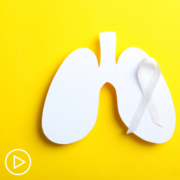Persistence in the Face of Dismissive Healthcare: One Patient’s Journey
Persistence in the Face of Dismissive Healthcare: One Patient’s Journey from Patient Empowerment Network on Vimeo.
Wanda was diagnosed with non-small cell lung cancer (NSCLC) in the prime of her life. She fiercely advocated for herself even after initially facing dismissive healthcare. Wanda shares the importance of “not equating a death sentence with a cancer diagnosis just because a member of your care team says you don’t have long to live.” She shares valuable lessons learned on her lung cancer journey and the importance of listening to your intuition and body.
Download Resource Guide | Download Resource Guide en español
See More from [ACT]IVATED NSCLC
Related Resources:
Transcript:
My name is Wanda, and I was diagnosed in my early 40s with non-small cell lung cancer. I’m a Black woman, and like many others, my path to diagnosis wasn’t straightforward.
My symptoms began with feeling fatigued and like I might faint. My intuition told me that something was wrong, and I had testing done to help diagnose what the issue might be. A nodule was found in my lung, but I felt dismissed by my doctor even though I was knowledgeable about my health and potential health issues. I requested a scan to further investigate the lung nodule, but my doctor dismissed my concerns and wouldn’t run the test. After I eventually received a PET scan of my lung, the pulmonary specialist who reviewed my scan dismissed my concerns and decided to do another scan in 6 months.
Over the next 6 months, my symptoms continued to worsen with more severe fatigue, weight loss, and wheezing. I knew that I had lung cancer and felt trapped that I had to wait for the follow-up scan. When I finally received my diagnosis of adenocarcinoma, I felt a mixture of relief that I was right and anger that my cancer had worsened over the last 6 months. After two surgeries to remove lymph nodes and a portion of my lung, I’m doing well and am happy to share my story to help others who may feel dismissed by their doctors.
Some of the things I’ve learned on my lung cancer journey include:
- Educate yourself and ask your doctors questions. Learn about the available treatment options and discuss each one with your doctor. Doctors expect patients to have questions.
- Ask about clinical trial options, whether travel is required, and if there will be expenses that you or someone will need to cover on your behalf. Ask if there are programs that can help you with uncovered expenses.
- It’s always a good idea to seek a second opinion. Seeking a second opinion is nothing to feel guilty about, and you or your loved one’s life depends on an accurate diagnosis.
- Listen to your intuition and body. I knew something was seriously wrong but was dismissed by my doctors for months before my diagnosis.
- Avoid negative doctors and don’t equate a death sentence with a cancer diagnosis. Just because a member of your care team says you don’t have long to live doesn’t mean it’s written in stone.
These actions were key for staying on my path to empowerment.
Share Your Feedback:
Create your own user feedback survey










![[ACT]IVATED NSCLC Resource Guide [ACT]IVATED NSCLC Resource Guide](https://powerfulpatients.org/wp-content/uploads/1-27-180x180.png)


